Apartheid Free Baltimore
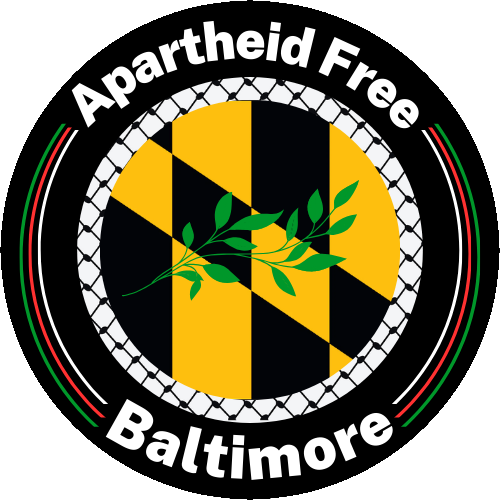

In partnership with
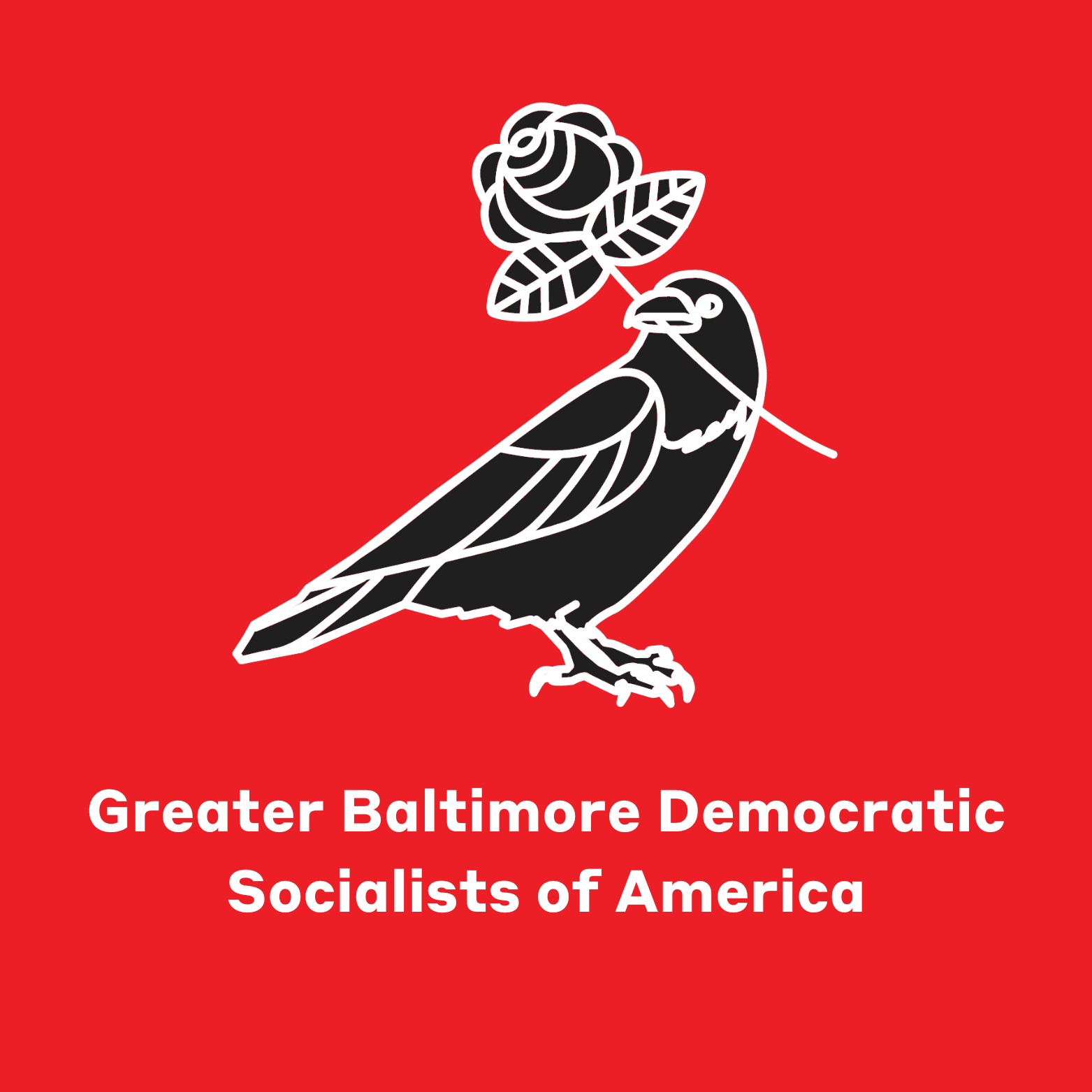

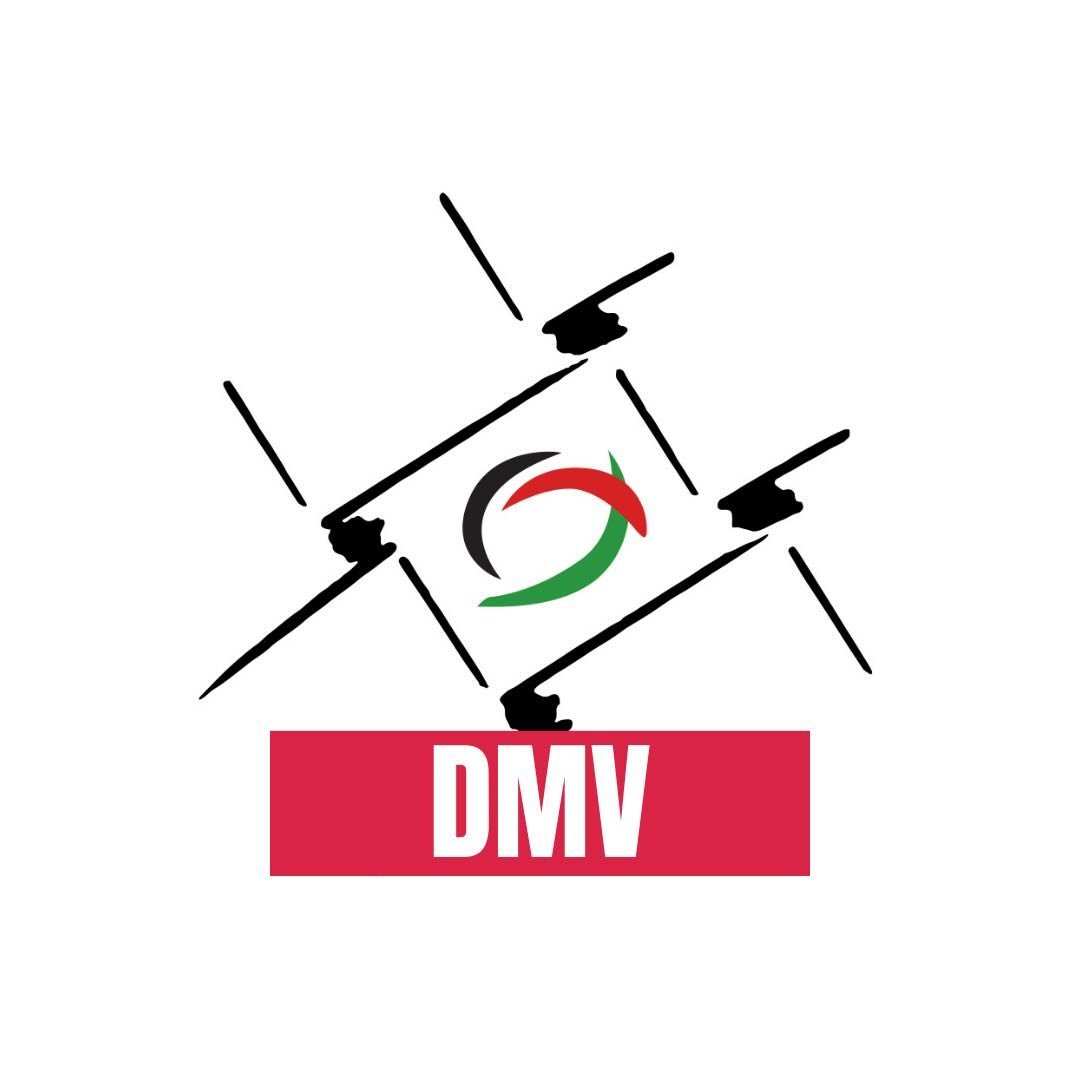
As the fight for Palestinian liberation continues, the Greater Baltimore chapter for the Democratic Socialists of America (GBDSA) has launched a locally targeted Boycott, Divestment, and Sanctions (BDS) campaign. Inspired by the Apartheid Free Zones and No Appetite For Apartheid campaigns, Apartheid-Free Baltimore seeks to transform Baltimore into a dead zone for Israeli commerce, educate and mobilize residents, and serve as a launching point for expansion into the rest of the state. GBDSA is seeking endorsements and partnerships, primarily from Palestinian and anti-Zionist Jewish organizations in this campaign.
About
The Palestinian BDS National Committee, the largest leading BDS coalition in Palestinian society, categorizes boycotts to effectively target specific companies, products, and sectors involved in Israeli apartheid, settler-colonialism, and human rights violations. This strategy enhances the impact of consumer boycotts, divestment, and institutional pressure.
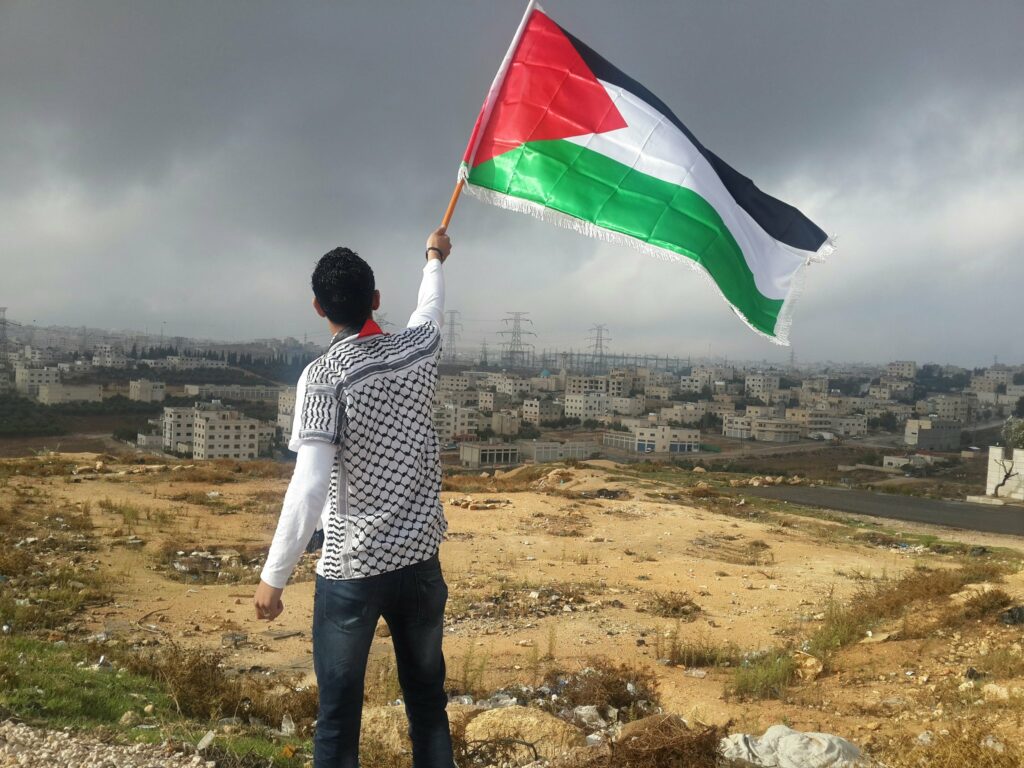
Our Partners & Endorsements
- Greater Baltimore Democratic Socialists of America (DSA)
- Jewish Voice for Peace (JVP)
- Palestinian Youth Movement (PYM)
Apartheid Free Businesses
Use the map below to find local businesses that have joined the campaign.
Get Involved
Targets
The Palestinian BDS National Committee, the largest leading BDS coalition in Palestinian society, categorizes boycotts to effectively target specific companies, products, and sectors involved in Israeli apartheid, settler-colonialism, and human rights violations. This strategy enhances the impact of consumer boycotts, divestment, and institutional pressure.
Avoid buying Israeli groceries, which may be identified with “Made in Israel” labels or barcodes beginning with 729. This can include a variety of produce, such as avocados, potatoes, oranges, eggplants, carrots, herbs, grapefruits, persimmons, peppers, figs, passion fruit, or jaffa oranges.
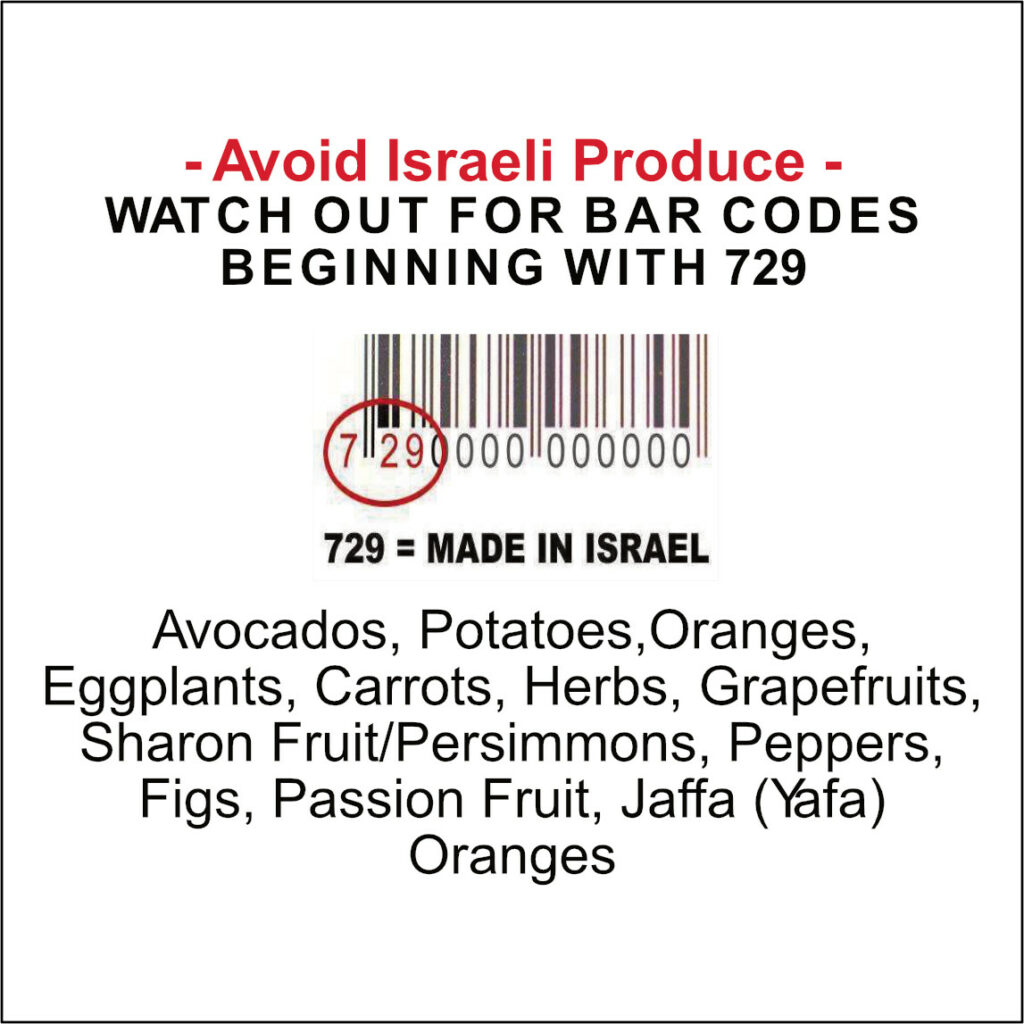
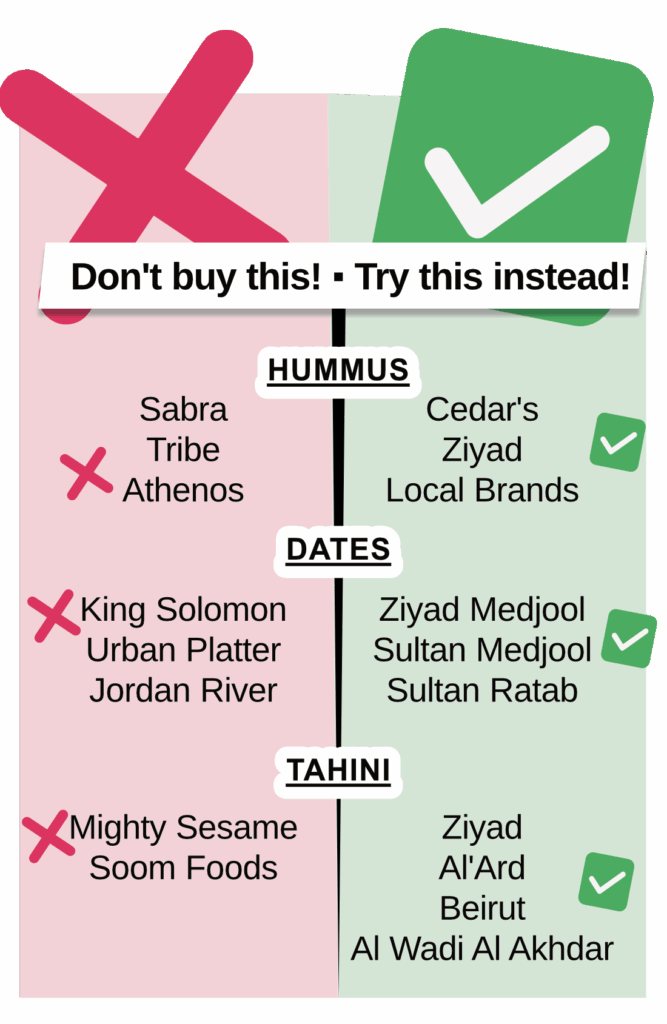
Additionally, avoid Israeli hummus, dates, and tahini. These brands include Sabra, Tribe, Athenos, King Solomon, Urban Platter, Jordan River, Mighty Sesame, and Soom Foods.
For these products, we recommend the following alternative brands which can be found locally: Cedar’s, Ziyad, Sultan, Al’Ard, Beirut, and Al Wadi Al Akhdar.
Looking for compliant products?
Expand to view more brands we recommend
FAQ
What is an Apartheid-Free Zone?
The Apartheid Free Zones (AFZ) campaign promotes solidarity with Palestinians by creating spaces free from complicity in Israeli human rights violations. As part of the BDS movement, AFZ aims to create progressive, intersectional spaces free from Israel’s genocide, apartheid, and settler colonialism, uniting various justice and equality struggles. AFZ strives to ensure community spaces–from coffee shops to local councils– cease supporting or profiting from apartheid or human rights violations. The ongoing war and genocide in Gaza underscore the need to expand AFZs globally.
To become an Apartheid Free Zone (AFZ), an organization, union, or local business commits to not supporting Israel’s regime of oppression. This can be achieved by:
- Avoiding business with companies complicit in Israel’s human rights violations (e.g., Intel, Microsoft, Carrefour, HP, Chevron, AXA).
- Following the Boycott, Divestment, and Sanctions (BDS) movement and the Palestinian Campaign for the Academic and Cultural Boycott of Israel (PACBI) guidelines.
- Divesting from and avoiding investments in complicit companies listed by the UNHRC, Who Profits, DIMSE, AFSC Investigate, and DBIO.
Being an Apartheid Free Zone (AFZ) means committing to equal rights for all and creating spaces free from racism, discrimination, and oppression. AFZ initiatives can align with other social, racial, gender, and climate justice movements. Globally, activists are collaborating with local councils, businesses, community centers, trade unions, and civil society organizations to declare themselves AFZs. This movement spans from Argentina to New Zealand, Norway to Kenya, and Italy to Japan. In some countries, student unions, civil society organizations, churches, and other groups have also declared themselves AFZs.
What is BDS?
Established in 2005, the Boycott, Divestment, and Sanctions (BDS) Movement is a Palestinian-led initiative designed to pressure Israel into complying with international law and respecting Palestinian rights. BDS will not rest until Israel is converted from an ethnocentric, genocidal, and settler-colonial state into a sustainable, secular, democratic state that provides unequivocal equality in citizenship and individual and communal rights to both Palestinians (including refugees) and Israeli Jews.
The primary goals of BDS include:
- Ending the military occupation and colonization of all Arab lands and dismantling the separation barrier in the West Bank and Gaza.
- Ensuring that Palestinian citizens of Israel have the same rights and opportunities as other Israeli citizens.
- Respecting, protecting, and promoting the rights of Palestinian refugees to receive reparations and return to their homes and properties, as stipulated in UN Resolution 194.
Inspired by the anti-apartheid movement in South Africa and the civil rights movement in the United States, BDS utilizes nonviolent means such as boycotts, divestments, and economic sanctions to achieve these objectives.
BDS is steered by the values of inclusivity, diversity, incremental progress, and sustainability, and is arguably the most ambitious and empowering initiative led by Palestinians for justice and rights. Its aim is to effectively challenge Israel’s colonial rule and apartheid in a morally consistent way.
Over the past two decades, Palestinians and their allies—unions, faith-based groups, institutions, and grassroots organizations—have launched successful BDS campaigns worldwide. The strategy’s core philosophy is that each campaign’s success and lessons inform future efforts.
BDS campaigns adapt to local contexts, using strategies that effectively raise awareness and apply economic and political pressure on companies and institutions involved in Israel’s Zionist settler-colonial activities. Some examples of BDS’s success include –
- SodaStream: In 2014, the Israeli company SodaStream closed its factory in the illegal West Bank settlement of Ma’ale Adumim following international pressure and boycotts.
- G4S: The security company G4S ended its contracts with Israeli prisons and checkpoints in 2016 after sustained BDS campaigns highlighting its role in human rights abuses.
- Veolia: In 2015, the French multinational withdrew from several Israeli projects, including the Jerusalem Light Rail, due to BDS pressure.
- Brooklinen: In 2023, following years of protests and pressure, the NYC-based linen retailer moved production of its products out of Israel.
- Alameda County, California: In 2024, a County BDS campaign successfully pressured the Board of Supervisors to vote to develop an ethical investment policy designed to move millions worth of investment dollars out of companies profiting off of its ties to illegal Israeli settlements.
Why BDS?
Israel’s illegal apartheid system has imposed economic hardship, restricted access to essential goods and services, and left Palestinians facing frequent power outages and limited healthcare and clean water, since the colonization project began in 1948. And since October 2023 the world has witnessed a nightmarish rise in genocidal acts, ethnic cleansing, illegal land grabs, and detainments. There is little reason to think that Israel is planning to ease up its grip any time soon, thanks in great part to Western collusion in the form of financial, diplomatic, academic and political support.
Israel is the largest cumulative recipient of foreign aid. According to the Council on Foreign Relations, since 1948, Israel has received over $310 billion in U.S. economic and military aid, making it the largest cumulative recipient of U.S. foreign aid. And according to an Institute for International Peace Studies in Stockholm report, $22 billion of U.S. tax dollars went to Israel between October 2023 and December 2024.
The UN and major powers, especially the U.S., continue to fail in holding Israel accountable under international law. On November 21, 2024, the International Criminal Court (ICC) issued an arrest warrant for Benjamin Netanyahu, the Prime Minister of Israel, for crimes against humanity, which include, “starvation as a method of warfare and […] intentionally directing an attack against the civilian population”. Since the warrant was issued, Netanyahu has visited the White House multiple times and flown over ICC signatory countries without detention.
Delivering justice to the Palestinian people can no longer be in the hands of governments. People who believe in humanity and justice must, at least, take action through their purchasing choices.
But is it anti-Semitic?
The BDS movement explicitly opposes all forms of racism, including anti-semitism. The initiative targets policies and actions of the Israeli government, not Jewish people or Judaism as a religion. A wide range of individuals and organizations support the BDS Movement, including many Jewish groups and individuals who believe in justice and equality for Palestinians.
Similar to the anti-apartheid movement in South Africa, the goal is to achieve equality and justice, not to discriminate against any group based on their ethnicity or religion. BDS demands are rooted in international law, including the right of return for Palestinian refugees, ending the occupation, and ensuring equal rights for Palestinian citizens of Israel. These are legitimate calls for justice and equality, not expressions of hatred or prejudice.
Take the Apartheid-Free Pledge
Apartheid-Free Baltimore businesses, organizations and individuals pledge to:
- Avoid doing business with companies complicit in Israel’s human rights violations
- Follow Boycott Divestment & Sanctions (BDS) & PACBI guidelines
- Divest from and avoid investments in complicit companies
Learn More
Download Our Brochures
Website Resources:
- Who Profits Research Center
- BDS Movement
- Decolonize Palestine
- US Campaign for Palestinian Rights
- Not My Tax Dollars
- Justice for All
- Jewish Voice for Peace
Books:
Boycott, Divestment, Sanctions: The Global Struggle for Palestinian Rights. By Omar Barghouti, Haymarket Books, 2011.
The Battle for Justice in Palestine. By Ali Abunimah, Haymarket Books, 2014.
The Destruction of Palestine Is the Destruction of the Earth. By Andreas Malm.
From the River to the Sea: Essays for a Free Palestine. Edited by Sai Englert, Michal Schatz, and Rosie Warren, Verso Books, 2024.
The Hundred Years’ War on Palestine: A History of Settler Colonialism and Resistance, 1917–2017. By Rashid Khalidi, Metropolitan Books, 2020.
Light in Gaza: Writings Born of Fire. Edited by Jehad Abusalim, Jennifer Bing, and Mike Merryman-Lotze, Haymarket Books, 2022.
On Palestine. By Noam Chomsky and Ilan Pappé, edited by Frank Barat, Haymarket Books, 2015.
Palestine: A Socialist Introduction. Edited by Sumaya Awad and brian bean, Haymarket Books, 2020.
The Palestine Laboratory: How Israel Exports the Technology of Occupation Around the World. By Antony Loewenstein, Verso Books, 2023.
Palestine Speaks: Narratives of Life Under Occupation. Edited by Mateo Hoke and Cate Malek, McSweeney’s, 2014.
Ten Myths About Israel. By Ilan Pappé, Verso Books, 2017.
